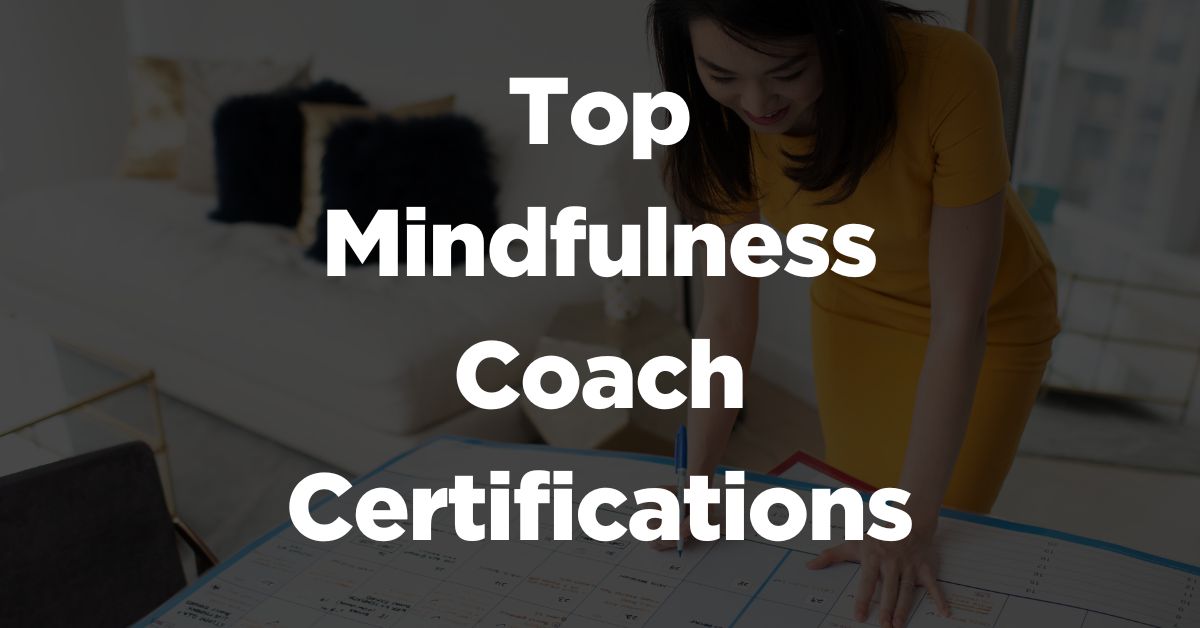Have you been considering getting your mindfulness coach certification?
Then you’ve come to the right place.
Today, we’ll cover:
- The most respected mindfulness coaching certifications available
- What a mindfulness coach does
- How to become one
Ready? Let’s get started!
The top mindfulness certifications are:
- Mindfulness-Based Stress Reduction Teaching Certificate (Brown University): Comprehensive training for mindfulness practitioners
- Mindfulness Coaching School: Accredited program for mindfulness coaches
- Training in Mindfulness Facilitation (UCLA): A year-long training for mindfulness facilitators.
- Certified Mindfulness Informed Professional Certification (PESI): A shorter, self-study course for all types of mindfulness practitioners
- Mindfulness Instructor Training (University of Illinois Urbana Champaign): A 10-week mindfulness instructor training
What does a mindfulness coach do?
Before we get too far, let’s make sure we’re on the same page about what mindfulness coaching is.
Mindfulness is a form of meditation that focuses on becoming aware of what you’re feeling in a specific moment. It relies on centering activities like breathing exercises and body scans.
Research shows that mindfulness can improve well-being while helping you manage stress, improve your sleep, and tackle your workload.
But most people need to learn mindfulness.
That’s what mindfulness coaches help their students do:
Use mindfulness techniques to improve their lives.
With those techniques, they’ll get better at their jobs, build healthier relationships, find more happiness, and so on.
Check out this article to learn more about what a mindfulness coach does.
Now, you might wonder what qualifications you need to become a mindfulness coach.
Read on to find out.
What qualifications do you need to be a mindfulness life coach?
One of the most common questions I hear from my students is if you need to be certified to become a coach.
The answer is no.
That’s because, for the most part, the coaching industry is unregulated.
What you need to become a mindfulness coach is direct experience and a proven way to help clients get results.
Get the Ultimate Guide
for building a
6-Figure Coaching Business so you can achieve more freedom!
That experience is what’s going to help your clients reach their goals.
Experience doesn’t necessarily mean your education or work experience.
For instance, if you’ve practiced mindfulness for years and have helped other people adopt mindful thinking, you have experience.
Or, let’s say you’re a yoga teacher who has taught students to incorporate calming breathing techniques into their practice. That’s also experience.
And your experience is what they care about!
In fact, your clients won’t ask what certifications you have. They want to see what results they can get from working with you.
(It’s important to note that a few health and mental health niches require certifications, so be sure to take note of those.)
But that doesn’t mean you can’t get certified.
To find out about mindfulness coach certifications, read on!
The best mindfulness coach certifications
What are the top mindfulness coaching certification programs?
There are a lot of certification programs out there, so you’ll want to do your research to find the best certifications available.
And here below are some of the top programs in the industry.
(Note: I haven’t taken these mindfulness coach certification programs myself. I’m recommending them based on their reputation within the coaching space, their accreditation, and public reviews.)
| Program | Organization | ICF accreditation | Duration | Price |
|---|---|---|---|---|
| Mindfulness-Based Stress Reduction Teaching Certificate | Brown University | No | 3-6 years (6 courses) | $14,225 |
| Training in Mindfulness Facilitation (TMF) | UCLA | No | 1 year | $7,000 |
| Mindfulness Coaching School Program | Mindfulness Coaching School | Yes | 1 year | $5,500+ |
| Certified Mindfulness Informed Professional (CMIP) Course | PESI | No | 12.5 hours (6 sessions) | $199.99 |
| Mindfulness Instructor Training | University of Illinois Urbana-Champaign | No | 10 weeks | $1,000 |
Mindfulness-Based Stress Reduction Teaching Certificate
Brown University
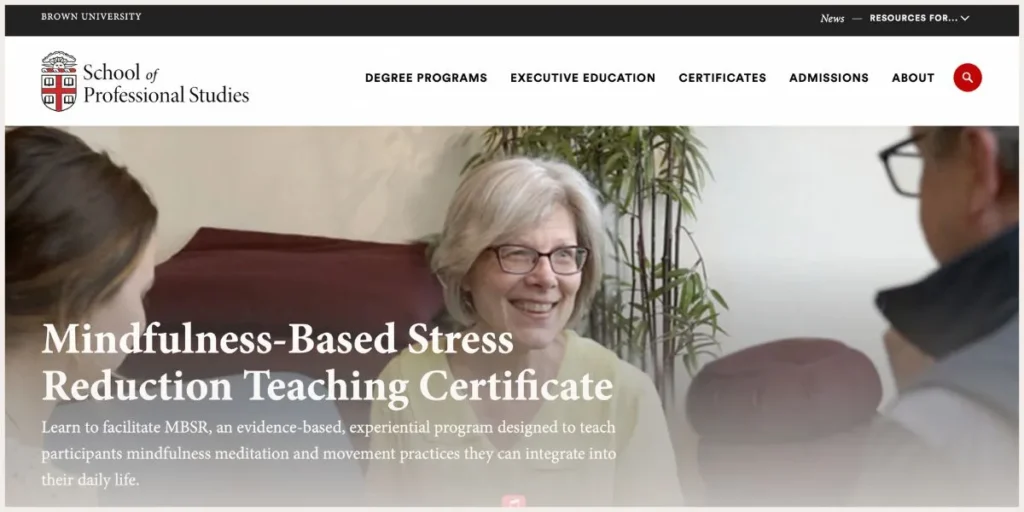
The Brown University Mindfulness-Based Stress Reduction (MBSR) Teaching Certificate offers a deep dive into mindfulness that you won’t experience anywhere else.
Before we get too deep into the course, let’s talk about what MBSR is.
MBSR is a mindfulness technique intended to reduce stress through weekly practices of activities like meditation and yoga. It’s popular among those looking to reduce anxiety and depression, manage chronic pain, fight addiction, lower blood pressure, and more.
Now, back to Brown.
The course is built as a sequential, three-step journey that includes six courses and one final review.
During the program, you’ll garner coaching skills necessary to guide meditation practices and group learning, learn the science of mindfulness, how to navigate trauma sensitivity, and more.
You’ll also participate in silent retreats and meet teaching requirements during the program.
Depending on if you choose to study part- or full-time, this program takes three to six years to compete. That said, you’ll be certified to teach in just one year.
Brown’s certification program also calls for students to meet certain prerequisites.
They include a graduate degree (or equivalent experience), a personal meditation practice of 2 years or more, a contemplative movement practice, attendance at an 8-week MBSR program, and participation in a qualifying silent retreat.
It’s important to note that Brown doesn’t recognize prior training from institutions other than Brown or the Mindfulness and Health Institute.
ICF accredited: No
Price: $14,225. This doesn’t include any extra costs related to retreats or teaching requirements. Click here to see the full tuition breakdown. Financial aid is available.
Key features:
- Upon completion, students will receive the Brown University Certificate in MBSR Teaching from the School of Professional Studies
- 398 hours of instruction, plus additional time for mindfulness practice
- Classes are held locally, nationally, internationally, and online
- Four silent retreats are required, including a week-long MBSR-focused retreat (115 hours)
- Access to the only researched rubric available for assessing mindfulness-based teaching effectiveness
Training in Mindfulness Facilitation (TMF)
UCLA

Taught at one of the best universities in the US, this year-long, science-backed program is one of the top mindfulness courses in the world.
By the end of the course, you’ll be able to facilitate mindfulness in your individual clients but also in office, university, nonprofit, therapy, and even medical settings.
The training takes place over the span of a year. During that time, you’ll engage in four Live Online classes, each of which lasts 4-5 days. You’ll also be required to attend meetings online or over the phone.
A hybrid option is available as well.
While it’s open to the general public, TMF has a few requirements for admission.
That includes 4+ years of mindfulness experience, 10+ hours of anti-racist and racial awareness training, and experience at silent mindfulness retreats. You can see the complete list of prerequisites here.
If you don’t meet those requirements, UCLA offers a 10-month Intensive Practice Program that you can take to get up to speed before training.
ICF accredited: No
Price: $7,000 for the course plus a $50 application fee. Financial aid is available.
Key features:
- Accredited by the International Mindfulness Teachers Association (IMTA)
- Certified as a Trained Mindfulness Facilitator (TMF) from the UCLA Semel Institute for Neuroscience and Human Behavior upon completion
- Live Online classes are held Thursday through Sunday, 9am to 5pm PST
- Regular check-ins with a mentor
- Must participate in one silent retreat during the course
- Monthly small group meetings
- Bi-weekly reading and writing assignments
Mindfulness Coaching School Program
Mindfulness Coaching School
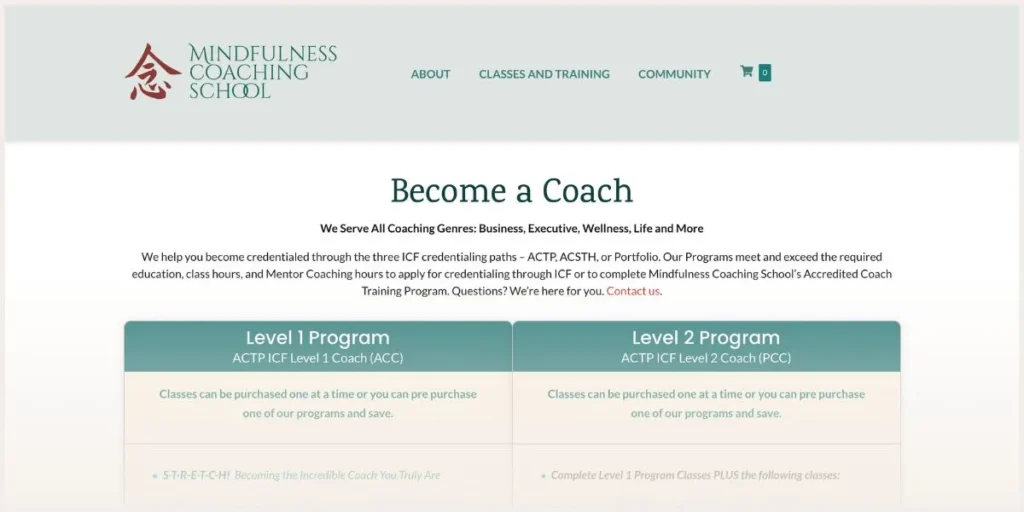
The Mindfulness Coaching School is ICF-accredited, which makes it stand out immediately.
They offer two programs: Mindfulness Coaching School Program ACSTH ICF Level 1 Coach (ACC) and Mindfulness Coaching School Program ACTP ICF Level 2 Coach (PCC).
Level 1 is a great way to get your feet wet when it comes to coaching. It’s also a good jumping-off point for learning to incorporate it into your current business.
Classes include Skillful Means (The Coaching Skill Set), The Art of Engaged Mindfulness (Settling the Mind for Intuition to Emerge), and Business Alchemy (Create Abundance & Live Your Vision). You’ll also have 10 hours of mentor coaching.
On the other hand, Level 2 is great for those who are already a coach but are looking to deepen their experience.
It includes every class offered in Level 1, as well as classes like Body Electric, Deeper than Words (Compassionate Communication for Today’s Leaders), and The Dynamic Trio (EMDR, Positive Psychology & Somatic Coaching). Students will also have 10 hours of mentor coaching.
You don’t have to complete Level 1 to enroll in Level 2.
Instead, you’ll receive Level 1 during your Level 2 training once you’ve completed all classes and acquired at least 100 coaching client hours.
When you’ve coached 500 client hours, you’ll receive your Level 2 without any additional testing.
ICF accredited: Yes
Price: When pre-purchased, Level 1 is $5,500, and Level 2 is $8,700. When classes are purchased separately, Level 1 is $5,800, and Level 2 is $9,425.
Key features:
- Upon completion of Level 2, you’ll receive the Mindfulness, Wellness & Somatic Coach Certification
- You don’t have to complete Level 1 to enroll in Level 2
- Both courses exceed the required education, class hours, and Mentor Coaching hours needed to apply for ICF credentials
Certified Mindfulness Informed Professional (CMIP) Course: Evidence-based Interventions for Anxiety, Trauma & More
PESI
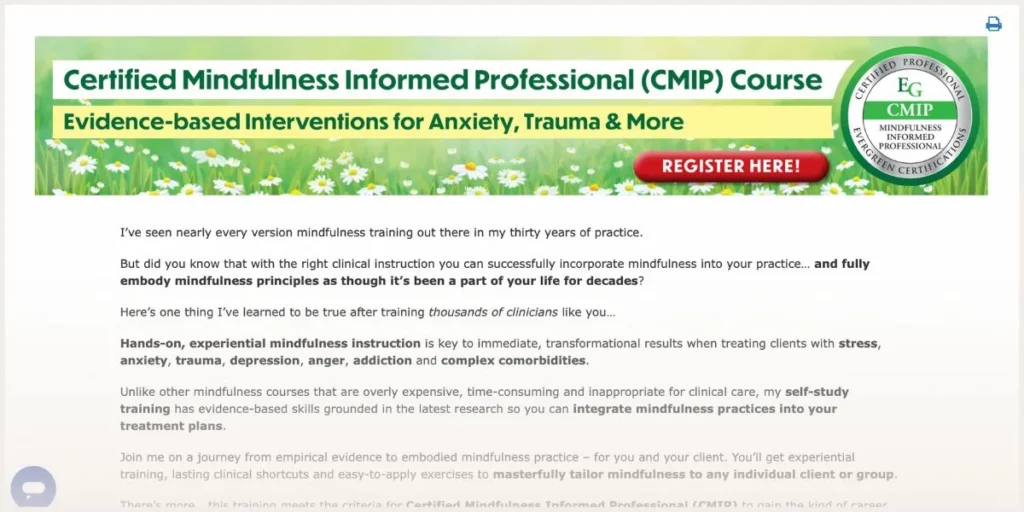
If you want to earn your Certified Mindfulness Informed Professional (CMIP) certification on your own timeline, this course might be for you.
Taught by clinical psychologist Debra Alvis, this CMIP course includes 12.5 hours of class time spread over six sessions. When you take your classes is up to you – the course is self-study training.
Those sessions will teach you to incorporate mindfulness-based exercises into your coaching practice, use mindfulness with individuals and in groups, and strengthen your individual mindfulness practice.
Course modules focus on teaching you to explain mindfulness simply and through metaphors and visuals. That will empower you to build rapport with your clients, fight their preconceived notions of mindfulness, and avoid a shutdown by engaging all five senses.
Get the Ultimate Guide
for building a
6-Figure Coaching Business so you can achieve more freedom!
Professionals who apply for the CMIP certification include counselors, therapists, social workers, case managers, addiction counselors, and more.
ICF accredited: No
Price: $199.99
Key features:
- Self-paced
- Includes the CMIP mindfulness coach certification cost upon completion of the course
- Access to a learning portal
- Lifetime access to on-demand learning resources
- Bonus resources, including Growing Mindful 2nd Edition: Mindfulness Practices for All Ages
- Bonus video module (15 Must-Have Mindfulness Techniques for Clinicians)
- Bonus eBook (The Mindfulness Toolbox for Relationships: 50 Practical Tips, Tools & Handouts for Building Compassionate Connections)
Mindfulness Instructor Training
University of Illinois Urbana-Champaign
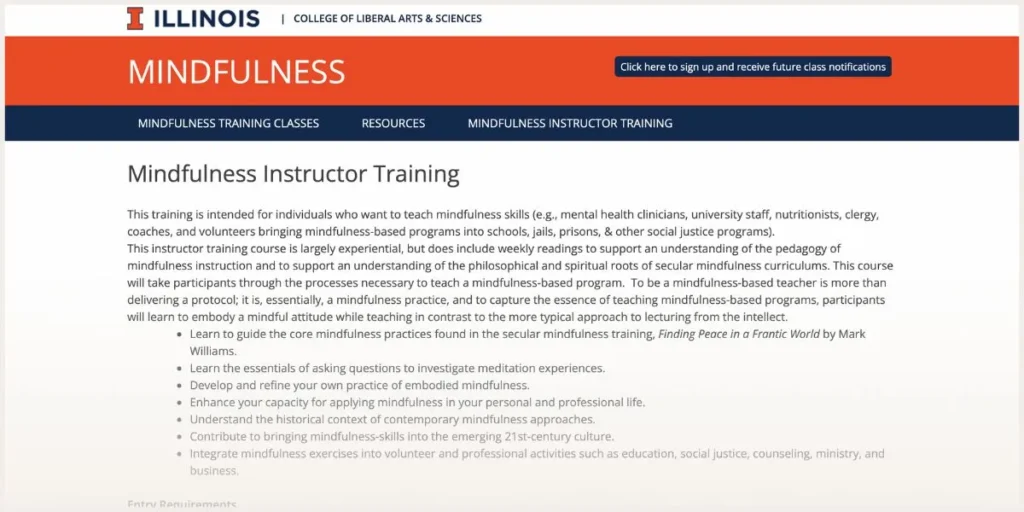
This instructor training program was created for anyone who wants to teach mindfulness skills to their clients or those they work with in a non-clinical environment. This includes mental health clinicians, university staff, clergy, coaches, and even those volunteering in schools, jails, or social justice programs.
The course itself is rooted primarily in experience but includes weekly readings centered on mindfulness education and the roots of mindfulness curriculums.
In addition to learning practices based on Finding Peace in a Frantic World by Mark Williams, you’ll refine your own mindfulness, find new ways to enhance your capacity for using it, learn to use mindfulness in volunteer opportunities, and more.
By the program’s end, you’ll grasp the basics of incorporating mindfulness into your everyday processes while maintaining a mindful attitude.
The course is a 10-week training that meets for two hours each week, plus outside coursework. Classes are held on Zoom.
Because this course is taught at a university, there are two prerequisites that students must have completed before application: at least a year of their own mindfulness meditation practice and the U of I Mindfulness Training 8-week class.
Alternatives to the Mindfulness Training class include equivalents such as MBSR and MBCT classes.
The application process is simple and is done by sending your resume and a short essay about mindfulness to the professor.
ICF accredited: No
Price: $1,000
Key features:
- 10-week course
- Easy application process
- Classes meet for 2 hours per week online
- Assigned weekly readings
- Weekly in-person or online practice to facilitate FPFW meditation practice
- Students are encouraged to attend mindfulness retreats
These are what I consider to be among the most respected coaching certification programs.
Want to find out how to choose one? Keep reading.
How to choose a mindfulness life coach certification program
Here’s what to consider when choosing the right certification program for you.
ICF Certification
Because certifications are unregulated, determining which ones are trustworthy can take time and effort.
I always recommend that my students look for certification programs associated with the International Coach Federation (ICF). It’s the closest thing to a reputable authority the industry has.
When you see an ICF-accredited program, you can be sure that it’s trustworthy and will boost your credibility.
That said, you don’t have to choose an ICF-accredited certification.
Any of the above are reputable and trustworthy, especially because a majority of them are associated with well-known organizations or respected universities.
The other thing you have to think about is what the course is all about.
What does it offer?
And does it line up with what you’re looking for?
That brings me to my next suggestion.
It should align with your goals
Let’s face it: Getting your mindfulness coach certification is a huge investment of time and money.
Before you commit, you should be sure that it offers precisely what you want in a course.
Does it line up with your goals and the things you’re hoping to learn?
It should also work for your individual situation, whether you need more flexibility through remote learning or self-paced study or prefer a more time-sensitive and in-person environment.
We’ve discussed the best mindfulness coach certifications and covered what to consider when choosing one.
Are you ready to learn how to become a successful mindfulness coach?
Then keep reading!
How do you become a mindfulness coach?
All you need to get started as a mindfulness coach is experience and knowledge.
But you’ll need a niche and paying clients to build a scalable business.
We’ll get to that in a minute – first, let’s talk about the average mindfulness coach salary.
How much do mindfulness coaches make?
On average, coaches in the US make $67,800 per year – but those are part-time coaches.
As a full-time mindfulness coach, there’s no limit when it comes to how much you can make. Several of my coaching students have scaled their own businesses into six- or multiple-six-figure businesses.
So can you, as long you’re willing to do the work.
The foundation of any successful mindfulness coaching business is choosing the right niche.
Let’s talk about how to find it.
How do you choose your niche?
Sure, mindfulness coaching is a niche all on its own.
But to stand out, you have to get specific.
Consider the people you’re helping and the methodology you use to help them reach their goals. That methodology is the “secret sauce” that will help you find your niche and set you apart.
Maybe you’ve come up with a proven way to help people better manage their work-related stress or improve their sleeping habits. Those are niches!
Serving a targeted audience, such as C-suite executives or those battling addiction, is also a niche.
I’ve put together a list of the most profitable niches to get you started.
How do you get coaching clients?
Once you’ve figured out what your niche is, you can focus on landing your first mindfulness clients.
I recommend you try one of the following.
Tap into your network.
The people in your network already know and trust you.
Chances are, at least one of them could use your help incorporating mindfulness into their day-to-day life.
Don’t be afraid to ask – that’s how I got my first clients.
Check out social media.
Take some time to explore social media and find the kind of online communities relevant to your niche.
Sites like Reddit, Facebook, and LinkedIn are great places to start.
But when you sign up, don’t immediately offer your services. Instead, focus on providing value to establish yourself.
Get the Ultimate Guide
for building a
6-Figure Coaching Business so you can achieve more freedom!
Do the guest post and podcast circuit.
Landing guest writing and podcast opportunities are easier than you might think.
And it’s one of the best ways to establish yourself as an expert.
Whatever you do, don’t do all of these things at once. Instead, choose one of these strategies and focus on it.
Once you’ve got a few clients, you can start incorporating other strategies to scale your business.
Next steps
That’s it!
We’ve talked about how to become a mindfulness coach, discussed the best mindfulness coach certification programs, and explored how to find your niche and get clients.
With or without a mindfulness coach certification, you’ll need to build and scale your business.
Contrary to popular belief, you don’t have to hustle 24/7 to do it.
You can grow your mindfulness coaching business to a six-figure venture while still working your 9-5. I’ve done it, and so have several of my clients.
If you’re ready to get started, get my guide to learn how to build a six-figure coaching business.

Want to Build a 6-Figure Coaching Business So You Can Achieve More Freedom?
When you sign up, you’ll also receive regular updates on building a successful online business.
Learn more:
Why You Don’t Need a Coaching Certification
The Best Life Coaching Certification Programs
What is Mental Health Coaching?
What is Stress Management Coaching?
The Best Health Coaching Certification Programs
The Best Wellness Coaching Certification Programs
